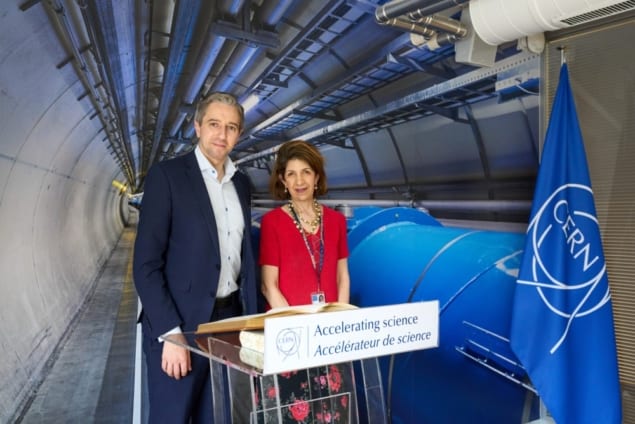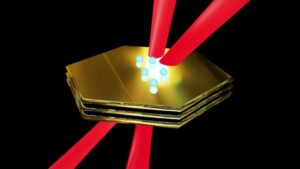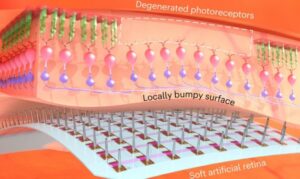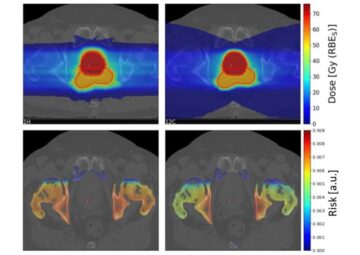
The Irish government has finally applied to join the CERN particle-physics laboratory near Geneva as an associate member. The application will be considered at CERN’s next council session in mid-December.
CERN has 23 full member states with Cyprus, Estonia and Slovenia applying for that status too. Member countries pay costs towards CERN’s programmes and have representation on the CERN council. The lab currently has seven associate member countries, with Brazil on track to become the next associate member and Chile in the early stages of applying.
In announcing its application to join CERN, the Irish government says that associate membership will open doors for Ireland’s researchers and technicians, making them eligible for staff positions and fellowships at CERN, as well as for training schemes. Irish companies will also have greater access to CERN procurement programmes.
The cost of full membership for Ireland would be around €15.9m each year, with associate membership set at a minimum of 10% of that, or €1.59m per year. Ireland may, though, recoup some of that cost through industry contracts, CERN positions and through training and education. The Irish government also approved an additional €300,000 per year for Irish researchers and teachers to participate in CERN programmes.
Ireland has long debated whether to join CERN, with scientists in Ireland already playing a part in CERN experiments such as LHCb, CMS and ISOLDE, the lab’s isotope mass separator facility. A turning point towards joining the lab came in 2019 when a cross-party Irish parliamentary committee recommended the move. It warned that Ireland’s attractiveness to hi-tech companies and its claims to be a “knowledge economy” could be damaged by its absence from CERN.
This sends a strong message about the government’s intentions to invest in fundamental science
Lewys Jones
Sinéad Ryan, a theoretical physicist in Trinity College Dublin and leading advocate for membership, believes that Ireland’s membership will be “transformational” for science and particle physics in the country. “The associate membership track allows you to dial up your commitment and dial it back down again as you need to,” she says, adding that previous involvement with CERN for scientists in Ireland relied on informal relationships and “the generosity of colleagues outside of Ireland”.
Enda McGlynn, a particle physicist at Dublin City University, who previously worked at ISOLDE, says that physicists from Ireland always had to partner with groups from member states to participate in lab activities. This, he says, made it difficult “to create a sustained research agenda that we could pursue ourselves”. McGlynn hopes that associate membership will now give fresh impetus for improved fundamental research funding in the country.

Committee urges Ireland to join CERN particle-physics lab
The wider Irish physics community has welcomed the news too. “This sends a strong message about the government’s intentions to invest in fundamental science,” says Lewys Jones, a physicist at Trinity College Dublin. “It demonstrates a welcome shift in ambition for a small country to contribute to this big project.”
CERN is likely to send a task force to Ireland early next year with accession then being considered by CERN’s council in mid-2024. If all goes well, the process could be complete by the end of 2024.
Yet any hopes that CERN will become a fully fledged member may have to wait. A spokesperson for Ireland’s department of science, innovation and education told Physics World that the government will review membership status after five years from taking it up “to determine Ireland’s future relationship with CERN”.
- SEO Powered Content & PR Distribution. Get Amplified Today.
- PlatoData.Network Vertical Generative Ai. Empower Yourself. Access Here.
- PlatoAiStream. Web3 Intelligence. Knowledge Amplified. Access Here.
- PlatoESG. Carbon, CleanTech, Energy, Environment, Solar, Waste Management. Access Here.
- PlatoHealth. Biotech and Clinical Trials Intelligence. Access Here.
- Source: https://physicsworld.com/a/ireland-set-to-join-the-cern-particle-physics-lab/
- :has
- :is
- $UP
- 000
- 2019
- 2024
- 23
- a
- About
- access
- activities
- adding
- Additional
- advocate
- After
- again
- agenda
- All
- allows
- already
- also
- always
- ambition
- an
- and
- Announcing
- any
- Application
- applied
- Applying
- approved
- around
- AS
- Associate
- At
- back
- BE
- become
- being
- believes
- Big
- Brazil
- by
- Chile
- City
- claims
- club
- Cms
- colleagues
- College
- commitment
- committee
- community
- Companies
- complete
- considered
- contracts
- contribute
- Cost
- Costs
- could
- Council
- countries
- country
- country’s
- create
- Currently
- Cyprus
- demonstrates
- Department
- Determine
- difficult
- discuss
- doors
- down
- dublin
- each
- Early
- Education
- eligible
- end
- estonia
- experiments
- Facility
- fellowships
- Finally
- five
- flags
- For
- Force
- fresh
- from
- full
- fully
- fundamental
- funding
- further
- future
- Geneva
- Give
- Goes
- Government
- greater
- Group’s
- had
- Have
- he
- hi-tech
- higher
- Higher education
- Home
- hopes
- http
- HTTPS
- if
- image
- improved
- in
- industry
- informal
- information
- Innovation
- intentions
- Invest
- involvement
- ireland
- Irish
- issue
- IT
- ITS
- join
- joining
- jpg
- june
- lab
- leading
- likely
- Long
- made
- Making
- Mass
- max-width
- May..
- member
- membership
- message
- minimum
- Near
- Need
- news
- next
- now
- of
- on
- open
- or
- outside
- Parliamentary
- part
- participate
- partner
- Pay
- per
- Physics
- Physics World
- plato
- Plato Data Intelligence
- PlatoData
- playing
- Point
- positions
- previous
- previously
- process
- procurement
- programmes
- project
- pursue
- recommended
- relationship
- Relationships
- representation
- research
- researchers
- review
- Role
- says
- schemes
- Science
- scientists
- send
- sends
- session
- set
- seven
- she
- shift
- Simon
- Slovenia
- small
- some
- spokesperson
- Staff
- stages
- States
- Status
- strong
- such
- taking
- Task
- task force
- teachers
- that
- The
- Them
- then
- theoretical
- this
- though?
- Through
- thumbnail
- to
- told
- too
- towards
- track
- Training
- Trinity
- true
- Turning
- turning point
- university
- urges
- visited
- wait
- we
- welcome
- welcomed
- WELL
- when
- whether
- WHO
- wider
- will
- with
- worked
- world
- would
- year
- years
- You
- Your
- zephyrnet













